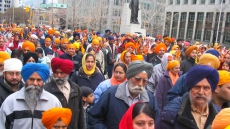As Pakistan's blasphemy laws guarantee the death penalty or life imprisonment, it has become common for radical Islamic groups in that country to slap blasphemy charges on locals who are unwilling to convert, a Sindhi-American human rights activist has told a US Congressional panel, and cited a case of the anti-Hindu violence that broke out in Sindh's Ghotki last month over a false blasphemy charge on a Hindu school principal.
Fatima Gul, testifying before the Committee on Foreign Affairs, Subcommittee Asia, the Pacific and Non-Proliferation, during the hearing on "Human Rights in South Asia: Views from the State Department and the Region" said, "The vast majority of Pakistani citizens experience oppression, violence, and religious and political persecution by government authorities and their supporters daily..
With the US directly supporting the Pakistani government economically, Pakistani authorities have been able to persistently increase their stranglehold on citizens across the country."
Audience spellbound as @SAPAC's Fatima Gul offers a devastating critique of #Pakistan's litany of human rights abuses including forced conversion of minor Hindu girls. All #HinduAmerican groups owe her a debt of gratitude. #HFAC #Iheartkashmir
— Suhag A. Shukla (@SuhagAShukla) October 22, 2019
She urged the US Congress and the Trump administration to put pressure on Pakistan to immediately release and save the life of Ghotki school principal Notan Lal.
Recounting the Ghotki incident, she said on September 15, 2019, religious extremist groups and gangs of local thugs attacked temples, houses and businesses of the Sindhi Hindu Community in Ghotki.
"The attackers left chaos and terror across the neighbourhoods of Sindhi Hindus, with many fleeing. These attacks on the Sindhi Hindu community were carried out on the pretext that a professor, Notan Lal, had committed blasphemy. Lal and his wife had run a private school in Ghotki for almost two decades.
"One day, when Lal reprimanded a student for bad behavior, the angry student went to the police station and told officers that the Professor had insulted Mohammad, the Prophet of Islam. Despite the lack of evidence, Lal was taken into police custody. He has not been heard since then."
She said that since 1990, at least 75 people have been killed for blasphemy in Pakistan, while 40 people are serving life sentences or are on death row for blasphemy. Many times, people facing blasphemy charges are killed extrajudicially by fellow prisoners or even mobs and bystanders.
A Human Rights Watch report states: "The government has not amended the law and has instead encouraged discriminatory prosecutions and other abuses against vulnerable groups," she said.
"Even outside of Sindh, the persecution of religious minorities remains a salient feature of Pakistan. Hindus, Christians, Ahmadis, Hazaras, Shias and Zikri Baloch Muslims are common and helpless victims at the hands of religious extremist groups. These groups operate with government impunity," she said.
Gul said that in 1974, Pakistan's Parliament declared that Ahmadiyyas are aKafirs' (heretics). Since then, Ahmadiyyas have effectively been forced out of the political process because they are required to declare themselves non-Muslim in order to be granted a ballot.
"The choice is between practically renouncing our faith or vote," an Ahmadi activist told Human Rights Watch. "This is not a real choice."
As with the Sindhi Hindus, the Ahmadiyya community also continues to be a major target for prosecutions under the nation's blasphemy laws. There are constant migrations of Ahmadis out of Pakistan due to continued persecution and violence in Pakistan.
Human Rights Watch reports that the "Pakistan penal code continues to treat posing as Muslims' by Ahmadis as a criminal offense."
Ahmadis are required to declare to the state that they are not Muslims, thereby renouncing their faith. They constantly face social discrimination as militant groups and the Tehreek-e-Labbaik Pakistan (TLP) continue to accuse them of "posing as Muslims".
"Anyone who is accused of this vague crime can be convicted," she said.
Shias and Hazaras are often major targets by militant sectarian organisations. Many Hazaras "who practice the Shia faith" complain of violence against them by Pakistani authorities, as they are of Mongol descent.
Hazaras accuse the military establishment of supporting terrorist groups who have carried out massacres of Hazaras in the region.
Massacres of Pakistani Hazaras, including women, men and children, continues in Quetta and the surrounding area of Balochistan.
"For the last four years many Hazaras have been nervous to do even small tasks, like travelling to their jobs or having their children walk to School," she said.
Christian communities too suffer at the hands of state and non-state actors in Pakistan, she said.
Citing the latest Human Rights Watch report, she said that around 1,000 young Hindu girls and 700 young Christian girls were forcibly converted to Islam and married to Muslim men. Despite the Child Marriage Prevention Act in Sindh, "the forced conversion and marriage of young Sindhi Hindu and Christian girls goes overwhelmingly unchecked. Police and the courts remain passive in most of the cases."
Slamming Pakistan for its "gross neglect of medical care", she said that at one time Pakistan had the lowest prevalence of HIV, but over time that has changed. Pakistan now has the second-fastest growing HIV rate in Asia, with 20,000 new cases in 2017 alone. Many of these cases are due to unsafe medical practices. More than 800 Sindhi children alone have been infected with HIV."
According to the Centre for Global Development, between 2009-2014 the US gave the Pakistan $7.5 billion for economic and development-related assistance, while since 2013, USAID gave $30 million. "With the amount of aid Pakistan consistently receives for its public health sector, this HIV crisis should not have occurred at all."
She urged that a fact-finding mission should be conducted in Pakistan on "religious persecution and the involvement of governmental authorities in it". She also urged for an unbiased inquiry into the Ghotki incident involving various stakeholders of the town and listening to all members of the community.
